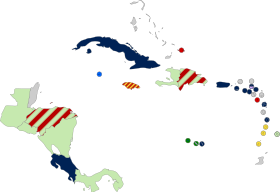Same-sex marriage in Cuba
[2] A draft family code containing provisions allowing same-sex couples to marry and adopt was approved by the National Assembly of People's Power on 21 December 2021.
[5][1] President Miguel Díaz-Canel signed the new family code into law on 26 September,[6][7] and it took effect upon publication in the Official Gazette the following day.
[18][19] On 21 July, the Secretary of the Council of State, Homero Acosta Álvarez, said that the draft constitution included a provision defining marriage as a "union between two people".
Instead, the commission chose to use gender-neutral language and define marriage as a "social and legal institution" without reference to the gender of the parties.
[37] In early March 2019, shortly after the constitutional referendum, the government launched a public consultation process on a new family code that would include provisions recognizing same-sex marriage.
[43] During the consultation process, some LGBT activists criticized holding a referendum on the issue of same-sex marriage, arguing that minority rights should not be put to a public vote.
The code also ensures greater protection for children and adolescents, the co-responsibility of parents in their education, and strict equality of rights between men and women.
It also guarantees the right of minors not to be the object of exclusion, violence or parental neglect, and establishes a uniform marriageable age at 18 for men and women.
[4][44] Approximately 67% of voters approved the changes to the code, making Cuba the first communist state and the 32nd country in the world to legalize same-sex marriages.
[47] Writing in the Havana Times, commentator and human rights activist Luis Rondón Paz argued that the government never intended to legalize same-sex marriage, and was instead seeking to deflect attention from other domestic issues and promote itself internationally as a progressive state.
[51] In an op-ed for the Council on Hemispheric Affairs, Tamara Hansen argued that "[s]ome [people] considered [that] pushing forward with explicit recognition of the right to same-sex marriage without building wider understanding and support could undermine the constitutional reform process.
[54] A pastor from the Metropolitan Community Church in Matanzas officiated at the marriage ceremony of Luis Alberto Vallejo Rodríguez and Luis Miguel Fernández Neves on 6 October 2019, in what is believed to be the first church wedding for a same-sex couple in Cuba, though the marriage lacked legal recognition at the time.

